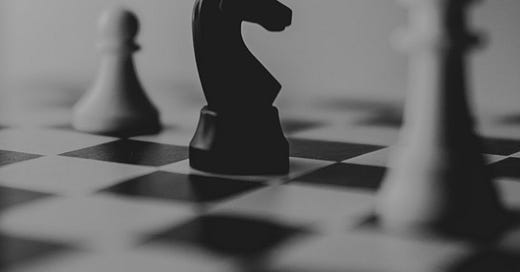Napoleon Bonaparte was a keen chess player. He applied game theory to war by anticipating opponents' moves, using deception and optimising resource allocation. Like a chess player, he valued positioning, coordinated movements for decisive strikes and made calculated sacrifices to gain strategic advantage. Napoleon also used psychological warfare, spreading misinformation to manipulate opponents' decisions. His ability to think in terms of long-term outcomes and precise timing turned battles into dynamic games, securing his dominance and formidable reputation.
Serious games
Life is a game. Play it. – Mother Teresa
Life is full of serious games, situations that involve strategic moves, responses and unpredictable outcomes. War, as we see in Ukraine, is a high-stakes game where strategy, resources and uncertainty shape outcomes, often with profound consequences. For an individual, finding a job involves navigating a system of scarcity, effort and opportunity, where focus and persistence lead to success.
In such games, actions trigger reactions, often from imperfect systems or individuals. Success isn’t guaranteed and randomness plays a role. Whether we realise it or not, we’re all playing games, competing for attention, resources and desired outcomes.
Business strategy is a game
Business is a game, played for fantastic stakes and you're in competition with experts. If you want to win, you have to learn to be a master of the game. - Sidney Sheldon
A game consists of key elements: players, rules, scarcity, choices, feedback loops and outcomes. Games have been studied by deep thinkers across disciplines, from nuclear proliferation and public health to poker, offering valuable lessons in strategy and decision-making that we can apply to our work.
Seth Godin’s book, This is Strategy, brought into focus the fact that business strategy is a game. Seth suggests the following characteristics of games generally apply:
You don't have to enjoy the game for it to be a game.
You're playing a game whether you realise it or not, and seeing the game helps you play it better.
The outcome of a game often has little to do with how much you want to win.
Everyone playing the game sees it differently.
Some games are easy to quit, other games are forever.
Not all players follow the same rules or have the same goals, even when playing the same game.
No game stays the same for long, because playing the game changes the game.
Short-term gains can lead to long-term losses and vice versa.
Sometimes the best way to win is to help others succeed.
Large games are made of smaller games, all the way down.
Most games are not fair and some games cannot be won.
The most valuable skills in one game may be useless in another.
Some games become easier as you win, others more difficult.
You don't always have to play the game you're offered.
Multiplayer games sometimes conceal themselves as two-player games.
We often spend more time figuring out how to win the game we're in instead of choosing which game to play in the first place.
Great incite is gained by connecting seemingly different domains. In this case, business and games.
Other resources
This is Strategy talk by Seth Godin
How to do Great Work post by Phil Martin
How to Create a Hit Product post by Phil Martin
Seth Godin suggests, You win by trying. And failing. Test, try, fail, measure, evolve, repeat, persist.
Have fun.
Phil…





This post challenged my thoughts. It's amazing what you have put together here. Thank you very much.